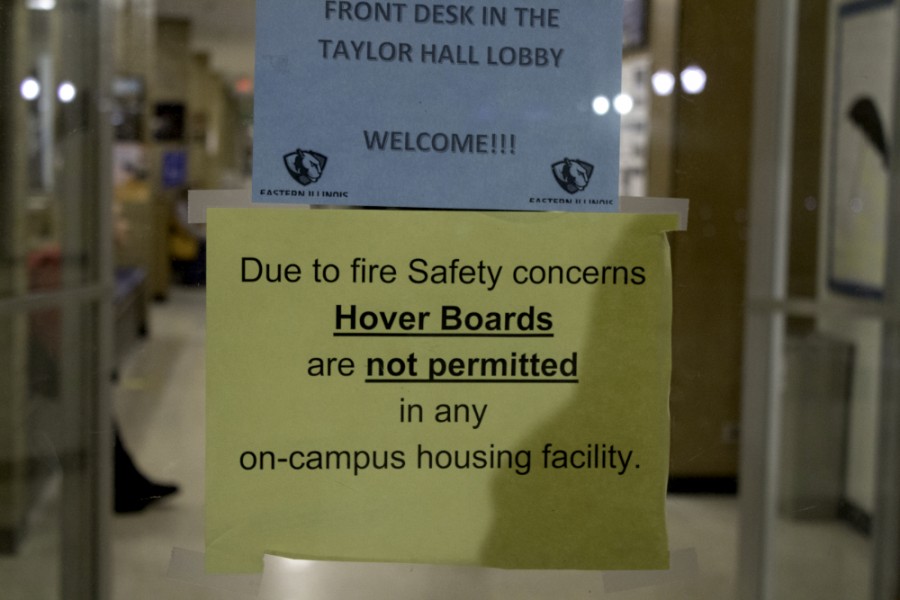Hoverboards banned from university housing
Signs that have appeared in the residence halls regarding hoverboard saftey issues on campus.
January 11, 2016
As of Jan. 8, hoverboards have been banned from university housing on campus, which includes residence halls, Greek Court, University Court, and University Apartments because of fire hazards.
Mark Hudson, director of housing and dining, said the fast policy change is not typical and is usually more of a long, thought-out process.
However, because of the prominent safety concern of hoverboards, swift action was needed.
“Funny how an issue can come up and create a new policy overnight,” Hudson said in an email.
Hudson said he decided to look into the hoverboard issue after University Marketing and Creative Services was contacted by CBS Chicago Channel 2 News asking if Eastern was doing anything about the boards.
“When the residence hall director at UIUC told me that they were the eighth campus in the Big Ten to implement a policy, I decided it was worth checking into,” Hudson said.
Hudson cited the U.S. Consumer Product Safety Commission and said the reason for the boards blowing up is because of the lithium batteries inside the hoverboards catching fire.
According an article from CNET, the U.S. CPSC reported 12 hoverboard incidents that were caused by the lithium batteries catching fire.
“Not all (hoverboards) are being built the same, and some are exploding, causing a fire hazard,” Hudson said.
Hudson said the issue is not brand new and currently, several other universities including The University of Illinois at Urbana-Champaign, Governor’s State University, Western Illinois University, and Northern Illinois University created a similar ban.
“Safety is a prominent concern on campus and safety drives policy,” Hudson said. “There was enough stuff lined up to put this policy in place.”
Students are asked to take their hoverboards homes as soon as they can and until then, they are not permitted to charge the hoverboards in the halls.
Hudson said the housing and dining staff will be working with students to inform them about the recent change to avoid confusion and conflict.
Refusal to comply within a reasonable amount of time will result in disciplinary action such as the confiscation of the hoverboards.
“We’re not trying to be mean, we just want to maximize a safe experience for students,” Hudson said. “I don’t like rules for the sake of having rules, there has to be a reason and this is a safety issue.”
The hoverboards will still be allowed on campus, but students cannot have them or charge them in university residence facilities.
The new policy was met with mixed reviews.
Nicole Estrada, a sophomore psychology major, said it is better to be safe than sorry and the policy was necessary.
Nate Gonzalez, a freshman undecided major, said the policy could be necessary since many people buy cheap knockoffs that catch on fire easily. “But some people pay good money for them, and they should be able to have them in the halls,” Gonzalez said. Venus Jones, a freshman kinesiology major, said hoverboards are a minimal risk, and the housing and dining staff is just making a big deal out of it.
“It is another way to get around campus, and it is like saying you can’t own a bike or car,” Jones said. “You have to take care of it and be responsible like anything else. They are just giving us stupid rules and not letting us be adults.”
Analicia Haynes can be reached at 581-2812 or [email protected]
















































